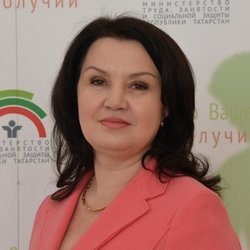Whose wages increase in Tatarstan in pandemic year
The salaries of many Russians went down a year ago, when due to the deterioration of the epidemic situation against the background of the coronavirus pandemic the country declared non-working days. Employees of the hotel industry lost the most in earnings: their incomes fell by 30% at once. Also, for obvious reasons, the situation of employees in the catering and tourism sectors deteriorated significantly. But there were also those whose salaries, on the contrary, increased in the conditions of lockdown, and of some of them — by more than 140%. Read more about those who earned and lost the most in the coronacrisis — in the review of Realnoe Vremya.
Cultural workers and hotel workers suffered the most
One of the most uncertain months in the last COVID-19 pandemic year was April, when first the first week of April was declared non-working, and then the entire month. Moreover, no one knew how long the lockdown would last and what to do to those who, due to the specifics of their business, simply could not switch to distance working. Naturally, this affected the salaries of Russians employed in the most affected industries. For many types of economic activity, it was in April when the lowest wages were recorded.
For example, in Tatarstan, the average wages of workers in the fields of culture, sports, leisure and entertainment decreased by almost a quarter (-24%) — from 40,000 in January to 30,400 rubles in April.
The salaries of the staff of hotels and catering establishments also decreased (-18,1%). Their average salaries fell from 25,100 to 20,500 rubles, and it was the hotel employees who suffered the most: the salaries of maids and other employees decreased by 30% — from 30,100 to 21,000 rubles.
However, the biggest drop in income occurred, oddly enough, among fishermen. The workers of the fishing field lost as much as 61,2% of their salaries, the average monthly earnings fell from 35,800 to 13,900 rubles.
The earnings of conference and exhibition organisers decreased by half (-49,3%). If at the beginning of the year they received an average of 53,500, then in April their earnings on average reached only 27,100 rubles.
Who earned the most?
But there were also those who, on the contrary, managed to earn more than usual in the conditions of the lockdown. For example, the workers in the field of oil and petroleum (associated) gas production received a salary in April (88,100 rubles) by 22% more than in January (72,200 rubles).
In the processing production of petroleum products, a salary increase was also higher by a quarter — 82,000 rubles against 65,500 rubles.
But the largest increase (+143,4%) in wages was observed among employees in the pipeline transport sector — 141,700 rubles against 58,200 rubles.
Judging by the contiguity of the industries of the increased salaries, it is likely that the employees received a bonus for the reporting period. The ministry of labour of Tatarstan also considers so.

The same opinion is expressed by Marsel Salikhov, PhD in Economics, Researcher at the Department of World Economy and World Politics of the Higher School of Economics:
“It was probably an annual bonus. In large companies, they pay annual bonuses somewhere in March-April, when they summed up the results of the year and calculated the financial results.
At the same time, the growth of wages in the monthly dynamics is observed in many industries and by the end of the year.
Perhaps, these nuances were reflected in the overall result, showing the final growth of wages in the republic. In total, for the surveyed types of economic activity in 2020, the average salary in Tatarstan increased by 5,7% from 37,442 rubles in 2019 to 39,558 rubles.
As Alexandra Sevostyanova, the head of the press service of hh.ru in the Volga Region, said, 16% of the republic's self-employed job seekers reported that at the end of 2020 their salary level had increased relative to the beginning of the year. More than half, namely 55%, reported that it remained unchanged. Another 25% said that the salary decreased.
Paradoxically, the largest increase in wages in the enlarged groups by type of activity was in the field “provision of other types of services” (13,4%) from 27,800 rubles in 2019 to 31,500 rubles in 2020. In this enlarged group, the salaries of employees of public organisations increased by 22,2% (from 34,000 rubles in 2019 to 41,600 rubles in 2020). Also, the earnings of repairers of computers, personal consumption items and household goods — by 22% (from 20,300 rubles to 24,700 rubles).
The three enlarged types of activity with the highest salary increase included the fields such as “information and communication activities” (+11,9%, from 48,200 rubles in 2019 to 54,000 rubles in 2020) and “administrative activities and related additional services” (+11,1%, from 24,700 rubles to 27,400 rubles).
This is also confirmed by Alexandra Sevostyanova: “The fact that their salaries increased more often than others' was said by representatives of the IT sector, lawyers and marketers.”
Only two enlarged groups by type of economic activity reduced the salaries of their employees. This is the “activities in the field of culture, sports, leisure and entertainment”, where salaries in 2020 decreased by 5,6% from 44,000 rubles to 41,500 rubles. And “the activities of hotels and public catering enterprises” (-1,4%), where the already small earnings decreased from 24,100 rubles to 23,800 rubles.
This circumstance, according to Klara Tazetdinova, led to a reduction in the average number of employees and to a decrease in employment in these industries.

Wage growth in Russia in 2020 outpaces inflation
For all the studied types of economic activity, the growth of wages in Russia last year amounted to 7,6% — this is 51,100 rubles (against 47,500 rubles in 2019). At the same time, there was no pronounced salary slump in April (in comparison with Tatarstan). The local decline in earnings in Russia (with the exception of the beginning of the year) peaked in August to 47,600 rubles (with an average value for the year of 51,000 rubles).
“In the summer months, payments were made through the tax service (while maintaining the number of employees) and, perhaps, for these reasons, a delayed effect was obtained," suggested Klara Tazetdinova, speaking about measures to support the most affected businesses.
Marsel Salikhov added that some companies in 2020 reduced wages by reducing working hours:
“In particular, the oil companies did so. Nominally, the salary remains the same, but in fact, it has been reduced, due to the reduction of the working week. In fact, employees can also work fully.
The only enlarged group where salaries in Russia decreased remains the activities of hotels and public catering enterprises, in which income decreased by 3,9% — to 26,900 rubles (from 27,900 rubles in 2019).
The three enlarged groups by type of activity where there was an increase includes “provision of other types of services” (+16,5%, from 34,600 rubles in 2019 to 40,300 rubles in 2020), “activities in the field of healthcare and social services” (+14,6%, from 43,100 rubles in 2019 to 49,400 rubles in 2020) and “activities in the field of information and communication” (14,2%, from 74,400 rubles in 2019 to 84,900 rubles in 2020).
If we look at the leaders in salary growth, all of them are somehow connected with the possibility to work remotely. For example, the salary of employees in the “software developemnt” increased almost fivefold over the past year from 27,600 rubles to 137,100 rubles. “The activities specialised in the field of design” showed an increase of more than three times from 23,500 rubles in 2019 to 76,700 rubles in 2020.
The employees of the “activities in the field of sound recording and publishing of musical works” received a salary more than twice as high as the previous ones (from 46,000 rubles in 2019 to 99,700 rubles in 2020).
In “construction”, the salary in “development of construction projects” increased significantly (by 83,7%) from 25,800 rubles in 2019 to 47,500 rubles in 2020.
According to Marsel Salikhov, in reality, such increase in salaries did not occur by the results of the year. This is indirectly confirmed by Sberbank's sberindex ,which has a fairly large customer coverage. The credit institution considers the change in the volume of labour compensation fund for all companies that have a salary project in the bank.
